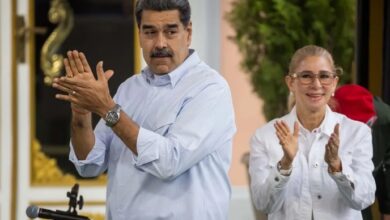Strategic Alliance, Huawei Phone and Trip to the Moon: This Is How Maduro’s Visit to China Ends
Nicolás Maduro, president of Venezuela, concludes his visit to China with a new strategic alliance, a Huawei phone and the promise of a trip to the Moon .

Photo: TW-NicolasMaduro
EFE | LatinAmerican Post
Listen to this article
Leer en español: Alianza estratégica, celular Huawei y viaje a la Luna: Así culmina la visita de Maduro a China
The president of Venezuela, Nicolás Maduro, concluded this Thursday his visit of almost a week to China that resulted in the signing of a "strategic alliance against all odds" with the Chinese president, Xi Jinping, who expressed support for Caracas for "maintaining his sovereignty" and gave him a Huawei brand phone.
Meetings with head of the legislature and prime minister
Maduro held a meeting this Thursday with the country's top legislator, Zhao Leji, who indicated that relations between China and Venezuela "have withstood the test of changes in the international scenario and have remained firm and stable."
The leader of the Legislative Assembly of the Asian country referred to the elevation of relations between Beijing and Caracas to a "strategic partnership against all odds" agreed this Wednesday during the meeting between Maduro and Xi, and assured that "it responds to the expectations of both peoples and demonstrates the firm determination of both countries to build a more just and equitable international order.
For his part, Chinese Prime Minister Li Qiang assured Maduro during the meeting they held this Thursday that China "will continue to firmly support Venezuela in protecting its sovereignty and dignity" and "opposing external forces to interfere in the internal affairs of the South American country under any pretext".
Maduro praised before Li "the world-renowned Chinese achievements in taking the path of development in accordance with its national conditions" and assured that the Asian country's development "has benefited both its own people and the world."
Huawei phone and criticism of the United States
The Venezuelan president highlighted today that China has become an "economic superpower," but that unlike others, it is neither "imperialist nor colonialist." Likewise, he predicted that "the old world of empires and colonialism will go to the Milky Way."
The Venezuelan president publicly thanked Xi for the gift of a smartphone, “the latest technological version” from the Chinese company Huawei.
Maduro received the latest folding model of the Asian giant's telephone brand and assured that he will use it to communicate "from now on" with Xi.
“I chose Huawei because it is the safest phone, impossible to be tapped by those who tap phones in the north,” he said, referring to the United States, which has sanctioned the company in recent years for its alleged ties with the Chinese Army.
A trip to the Moon
Maduro also expressed that one of his intentions with his visit to China was to make Venezuela a country that was part of the strengthening of space development. This is why he stated that it is in his interest that Venezuelans can participate in some way in the development of a Chinese space program.
On the social network X, formerly Twitter, he even fantasized about a Venezuelan trip to the moon with the support of China.
The Asian giant, in fact, does have the goal of sending a crew to the Moon in 2030 to establish a lunar base there. China has invested large sums of money in the space race in which it competes against the United States and China.
Thus, the Venezuelan president mentioned Venezuela's participation in China's space programs as part of his new strategic alliance.
A "fruitful" visit
The Bolivarian leader also took advantage of his visit, his fifth to the country and which he described as "fruitful" and "of great historical significance", to praise the economic, social and technological development of China, which he referred to on several occasions as a country brother.
Upon arrival, Maduro visited the southern city of Shenzhen, where he addressed the implementation of special economic zones, something he described as "fundamental" in the 21st century.
In the megalopolis, the first special economic zone established in China, Maduro indicated that "his country is "beginning to walk the path of constructing special economic zones as a way to diversify the economy and expand productive forces."
From Shenzhen he moved to Shanghai, where he met with the president of the New Development Bank of the BRICS group, Dilma Rousseff, and stressed that the BRICS bloc and the financial institution have in Venezuela "a partner, an ally, a friend."
The eastern province of Shandong was the next stop for the president, who visited the sacred Taishan mountain and "took steps towards twinning" between this region and the Venezuelan states of Anzoátegui and Monagas, both located in the east and rich in oil.
Maduro's visit to China is part of the strengthening of relations between both countries, which have strengthened in recent decades, especially since the mandate of the late President Hugo Chávez (1999-2013).




